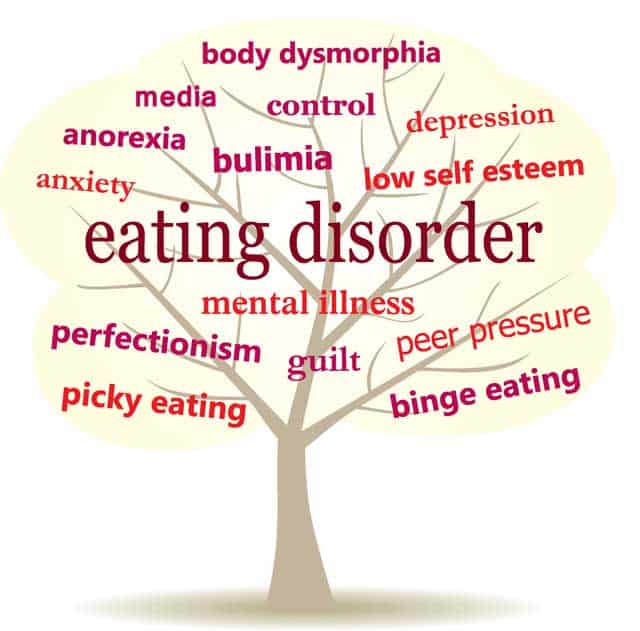Eating disorders can be quite paralyzing. Many believe that people who have eating disorders are making lifestyle choices. This is not the case. They are serious mental disorders and can even cost a person's life if not treated or dealt with appropriately. If you or someone you love is struggling with an eating disorder, whether it is anorexia nervosa, bulimia nervosa, binge eating, you deserve to lead an anxiety free life. The following 12 experts share below how you or someone you may know who needs the help can learn to deal and cope with the eating disorder that has taken over their life.
[accordions id="11825"]
1. Dr. Gerald P. Perman, M.D., P.A.

Patients who seek to lose weight through psychotherapy are doing so for a variety of reasons that include concerns about current and long-term adverse health consequences, about dying prematurely, and about their self-image and the negative impact on their mood and social life.
The difficulty in losing weight relates to the fact that we have many genes that encourage us to eat more and none that make us want to eat less and, as psychoanalyst Jacques Lacan wrote: "our greatest misery gives us our greatest pleasure," i.e. patients receive enormous gratification from eating to relieve feelings of tension, frustration and unhappiness even though being overweight is at the same time a contributor to this same unhappiness.
The goal in psychotherapy, whether individual, group, etc., is to help the person tolerate the feelings of deprivation that accompany making better food choices and losing weight. An important challenge to the therapist is to maintain a sense of hope in the face of the patient's difficulty in achieving their stated goal to lose weight.
2. Jill Lewis, MA, LCSW, CEDS

When working with someone who is struggling with an eating disorder, my focus is never weight loss. I aim to have an understanding of the need for the eating disorder as a coping mechanism and then work towards having a healthy body image, improve self-esteem, find alternative ways of masking feelings, and have improved healthy communication.
I work with the HAES model, health at every size. I come from a place of helping patients accept their bodies, and realizing how powerful they are. Eating disorders are not about food and the body, they have just become the substitute for expression and feelings. When patients really want to lose weight, I explore the need around the weight loss, what it means to them, and the fantasy they uphold when they lose the weight. I firmly believe in order to have recovery from an eating disorder, one must accept themselves, and realize losing the weight will not fix anything.
We suggest reading the following pieces:
- 58 Experts Share Life-changing Tips And Strategies To Stop Binge Eating
- How Do I Find Out If I Have Eating Disorder?
- Talking With A Lady Who Lifts: Emily Westfall
- Controlling Type 2 Diabetes Through Diet - Expert's Panel
- Experts Share How To Stick To Your Diet
- Link Between Sleep & Diabetes: Everything You Need To Know
3. Dr. Eva Altobelli MD
 Experts Share How To Stick To Your Diet
Experts Share How To Stick To Your DietA complicated issue to discuss, striving to get a handle on disordered eating—-once a client is in remission and stable—- if they would like engage in conversation about healthy weight loss—-it's best to do it from an educational point of view.
Engage the client as an active participant, so that he or she feels a sense of control. As largely eating disorders are born out of trying to create some control.
Educating client about exercise, nutrition, how certain foods create certain levels of energy—discussing with the client what he/she likes to eat, what he/she finds triggering, what might prompt him or her to engage in unhealthy eating or compensatory weight loss behaviors.
And maintaining a completely transparent relationship whilst discussing all of the above.
Steering the discussion not be specific to weight loss but specific to health and well-being.
As we need our clients to feel empowered to create lifestyles they feel comfortable living in, which includes bodies they feel comfortable living in.
Just because there is a history of an eating disorder does not mean that they're not allowed to try to lose weight in a healthy and responsible fashion.
4. Dr. Han Ren

Obviously binge eating makes it very difficult for an individual to lose weight. Disordered eating is frequently multifaceted with roots in metabolism, learned food behaviors in early childhood, attitudes towards self, and the role of food in one's life beyond physical nourishment.
To be able to lose weight with a binge eating disorder, one must first tackle the disordered eating behaviors. Often food is used as place-filler for comfort, love, and acceptance. There is also a huge social component to eating, as food is used to celebrate events and bring people together.
Strategies that build mindful awareness of eating habits are a good launching point for treating binge eating, such as eating slower, tasting each bite, and using grounding strategies to build awareness around the act of eating. Further treatment should address how one uses food and find other ways to fill the role of food in addressing emotional needs. Diets that only address weight loss rather than the psychological role of food are unlikely to be successful.
5. Dr. Alex Dimitriu, MD

I often tell my patients that mindfulness is the opposite of anxiety (or the "thinking too much" problem). On the anxiety end, people often have a tendency to worry about the past and the future, and more generally be lost in thoughts about things outside of the present. On the other end of the spectrum from anxiety is mindfulness - presence in the moment - or as I often tell my patients, the ability to enjoy family, food, music and sex. We increasingly live in a "thought-filled" anxious world, and we all could use a little more mindfulness in our lives.
Anorexia nervosa is often seen along with anxiety disorders (often as an attempt to control something fundamental, like eating). Bulimia or bingeing in general, is often an emotional outlet for a lot of pent up stress or sadness. It's the drive to treat yourself to too much ice cream, after a really hard day. In both cases, and life in general, mindfulness is key.
Giving ourselves time away from technology helps, and finding those rare moments to be present, are essential. The French, have been previously known to call Americans, "Pneumatic" or automatic eaters. On a most basic level - eating slowly and mindfully, rather than rushing or texting while doing so - can have a huge impact on a healthy relationship with food.
6. Dr. Jo Eckler, Psy.D.

When addressing weight concerns with patients, it can be helpful to focus more on adding healthful foods to the diet and increasing physical activity rather than solely on the number on a scale to avoid triggering past eating disorder thoughts and behaviors.
If a patient is gaining weight due to binge eating (eating very excessive amounts of calories in a short period of time), psychotherapy can be a helpful resource to address the issues that are underlying the behavior. Eating disorders are very difficult to treat, so if you have a patient with an active eating disorder, it is best to work as a team with eating disorder specialists.
7. Dr. Mercy Chieza, PsyD.

Even though eating disorders are complex, they mostly revolve around obsessions of food and eating. In most cases, a person suffering from an eating disorder struggles to maintain a certain weight and engages in unhealthy and dangerous methods to maintain this weight. However, it is important to note that eating disorders are mainly ways of coping with painful underlying issues. Psychologically, in-order to cope with a disorder, exploration of issues underlying that disorder is warranted. Therefore, once a person is diagnosed with an eating disorder, the first step is to seek psychological/psychiatric treatment in-order to address and explore underlying issues.
Research identifies a variety of factors contributing to development of eating disorders, and these factors typically can be grouped into three categories: biological such as genetic-hormonal or chemical imbalances, psychological such as lack of control of own life, low self-esteem and environmental such as conflictual family dynamics, culture or peer pressure. In most cases, a combination of these factors is involved. There are several ways to cope with eating disorders including education on healthy dieting and eating habits. Ability to lose weight plays a crucial role in one's recovery or coping with the eating disorder. Not only has a person with an eating disorder used maladaptive ways to lose weight, in most cases, this person has developed a misleading concept of what is supposed to be his/her ideal weight.
Therefore, coping strategies, among other things, should be focused on adjusting to appropriate methods of losing weight as well as resolving conflict between what he/she considers to be the ideal weight and weight within normal limits. Inability to lose weight using appropriate methods complicates this process of recovery or coping since a person is likely to revert to maladaptive ways of losing weight. Hence; addressing the ability to lose weight during psychological or/and physical treatment is paramount for successful coping to occur.
8. Dr. Lavanya Shankar, Ph.D.

Eating disorders are much more than attitudes around food and body image. Through regulating diet and exercise, individuals with eating disorders attempt to regulate their internal emotional states. Some people may attempt to neutralize feelings of sadness or anxiety, or perhaps purge feelings of anger or shame. This is an emotional issue at heart. It's an attempt to master the emotions through the body.
Eating disorders typically impede healthy weight loss and maintenance because the impetus for weight loss is emotional in nature and involves a strong struggle with the psyche and the body. It's fighting against oneself. Healthy weight loss works best when it starts with a basic acceptance and appreciation of one's body. For example, “I'd like to lose some weight to feel healthy and energetic, but I love and accept my body for my current health and all that my body does for me.” Weight loss can be achieved with so much more ease when we approach it by supporting ourselves.
If eating disorders are an issue, it is best to first seek treatment for the psychological issues that underlie the destructive behaviors before attempting to lose weight. When people find effective ways to become conscious of and regulate their emotions, then health and wellbeing naturally follow.
9. Dr. Anna Glezer, MD

What a complex topic to try to respond. I would say that those with eating disorders, including binge eating disorder, who are trying to lose weight should enlist the help of several professionals using a team approach: first, a nutritionist who has explicit experience in working with eating disorder patients (otherwise, there may be more harm than good), a psychologist/psychotherapist to help with the cognitive and emotional symptoms of the eating disorder and work through issues related to body image, self-esteem, etc., and a medical doctor (psychiatrist, primary care, etc.) to monitor labs and medical health in the process. The eating disorder must be addressed first and foremost for the individual to be able to successful attain a healthy weight and lifestyle.
10. Dr. Michael Levin, M.D.

Let's look at the eating disorders first. It was a bit thoughtless on the part of the DSM -5 committee to put two loosely related conditions under one umbrella – Eating Disorders only because they have something to do with food.
Anorexia Nervosa is recognized by distorted body image (warped reality) coupled with self-starvation and excessive work-out. Bulimia and Binge Eating Disorder, on the other hand, are diseases of episodic impulsive and excessive eating and lack of control over eating.
A person with anorexia is obsessed with body image and fatness, She utilizes strong executive control over any caloric intake and burning any calorie that sneaked in. She cannot diet, an action requiring balanced approach to food intake and acceptance of reality. Instead, in anorexia we observe pathological, unhealthy self-mutilation.
Binge Eating and Bulimia are disorders of impulse control. Binging is characteristic in both, but bulimia also includes self-induced vomiting and other means to undo the effect of binging. Depressed mood and shame following binging episodes are common in both. These are the disorders of strong drive and very weak executive control over impulsive food intake. The patients are too impulsive to diet, I wouldn't call periodic purging a diet.
To summarize, the eating disorders interfere with diet and must be treated first, before one can institute a sensible weight control program.
11. Dr. Britton Ashley Arey, MD, MBA

Weight is only one facet of eating disorders, the latter of which are very commonly symptoms of deeper, underlying issues -- early histories of trauma, anxiety, control issues, unresolved grief, body image issues, poor self esteem, attachment issues, depression, or a whole host of other disorders that can manifest in the use of food as a mechanism to self soothe, as well as something in the patients world over which they feel they have ultimate control. In this sense, eating disorders are similar to substance abuse in that they are often the surface manifestation of a feeling of loss or lack of control in one's world, and a much deeper issue that needs to be addressed.
Unfortunately, much like addictions, eating disorders can rapidly escalate from something over which a patient feels they are in control, into a disorder which takes control of the patient, and can be extremely disabling -- causing significant adverse physical, emotional, nutritional, and functional limitations in our patients lives.
Most commonly, the therapeutic focus is to first medically stabilize the patient (if they are in an active eating disorder), as these are among the most lethal conditions we treat in psychiatry, and can cause significant electrolyte imbalances that can contribute to cardiac arrhythmias and even death.
After that, as with everything we see in our field, we take a biopsychosocial spiritual approach to treating eating disorders: addressing any potential underlying biological or chemical imbalances, working to correct any distorted or inaccurate thought patterns that need to be challenged and restructured, increasing the social supports in our patients world and their authentic connections and stable attachments with others, as well as helping them find a way to center themselves and find their own path towards inner peace.
To answer your question about losing weight, the therapeutic focus would ential trying to separate out weight (a number on a scale) from health (and what the true markers of emotional and physical health and wellbeing are), as well as incorporating food as a part of, but not a sole focus of, a healthy lifestyle. This often involves a reconceptualization of one's appearance and entire being as more than the sum of its parts, and an expansion of focus from a reductionistic number on the scale -- something which requires significant cognitive restructuring through therapy. Additionally, intensive behavioral intervention is often required to interrupt the eating patterns and the hallmark of control over them that is so common in these disorders. Finally, the best and ultimate approach is one that tries to get to the root of the true underlying issue (attachment, trauma, depression, anxiety, etc) -- as treating this often results in a significant improvement in the manifestation of this issue through control of food and a focus on weight.
Once the mindset and mental framework of the eating disorder is addressed, as well as any underlying psychological issues (something that often takes quite some time), patients can often engage in a healthier relationship with themselves, with food, with their body image, and obtain a more balanced approach to health and wellbeing, including weight loss in a "normal" fashion (ie. through appropriate lifestyle interventions such as diet and exercise), that does not re-trigger a pre-existing eating disorder.
Further reading:
- 13 Tips to Help You Step off the Diet/Riot Roller Coaster
- Dietitians Answer Questions About Energy Levels, Picky Eaters, Plant Based Diet & More For Those With Type 2 And Prediabetes
- Vitamin D: How Much Sun Is Good For You?
- How Can You Stay on a Diet?
- Author Voice: Kyndra Holley
- Can Diabetes Type 2 Be Reversed? Experts Answer
12. Dr. Elayne Lansford, PhD

If one is trying to help a client in losing weight, and finds that they have an eating disorder, I think that client would be best served by a referral to an eating disorders specialist before implementing the food plan. An underlying eating disorder could make it difficult to comply with a food plan, and to do what is needed to lose weight. If the client tends toward anorexic behavior, they could become excessively stringent in losing weight.
If the client is a bulimic or compulsive eater, they may find it impossible to follow a food plan when in the grip of uncomfortable emotions, as they use food to numb such feelings. I think the likelihood of success with weight loss would be much higher if the eating disordered aspects of their behavior were addressed. There may be some online modules that could be used in conjunction with a weight loss plan, though anorexia is problematic enough that it would likely require individual and prolonged intervention.
We hope that some of the shared wisdom here will help you in making decisions that you are struggling with or fortify the decisions that you have made to take back control of your life. It is equally important to learn how to identify signs and symptoms of an eating disorder so that you can take the right measures to treat it. Unfortunately, if not dealt with earlier on, eating disorder, like any other addiction or disorders, can become disabling and prevent you from living your fullest. Please share your thoughts and comments on how you are dealing with your disorder and what has helped you so far. If you found the article useful share it with those who might need it.
TheDiabetesCouncil Article | Reviewed by Dr. Christine Traxler MD on May 28, 2020



